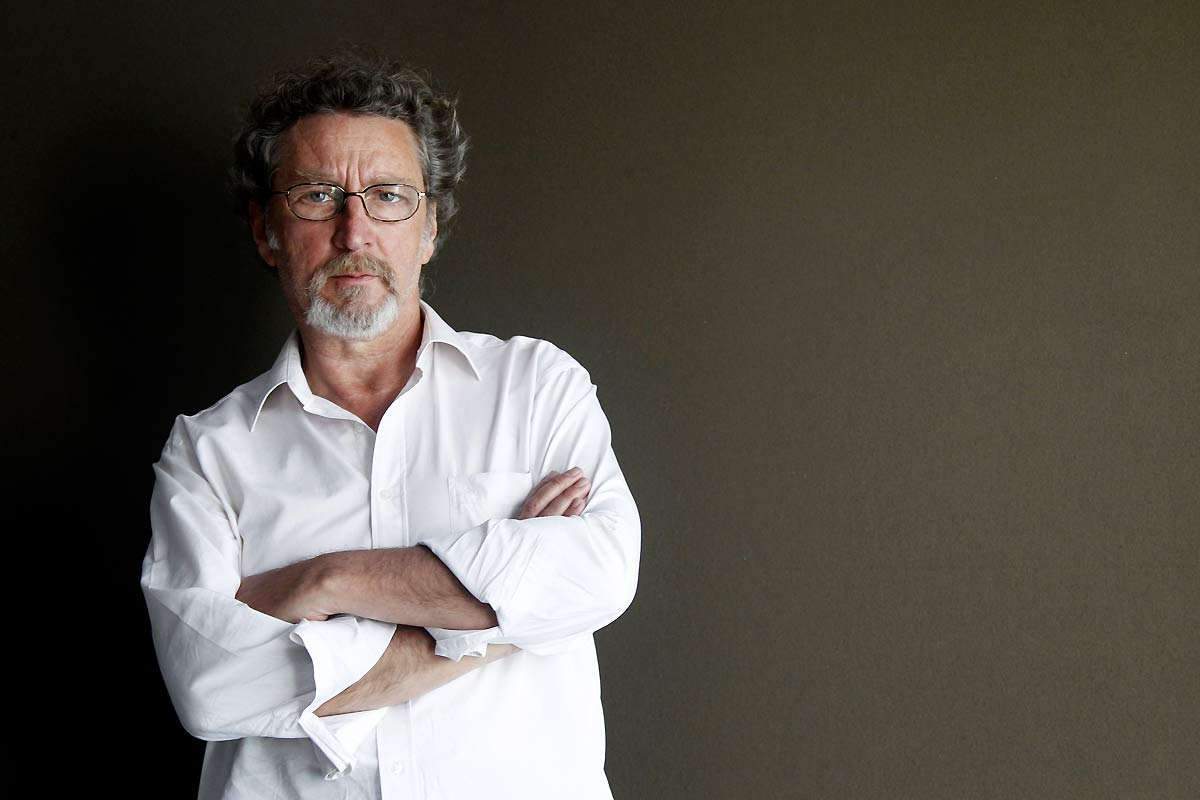“If I were completely pessimistic, I wouldn’t make films,” says the filmmaker, who has written a heartbreaking work, “Gloria Mundi”, where two cultures, two generations, the solidarity of the elderly and the selfishness of the youngest collide.
England has Ken Loach, France has Robert Guédiguian. Two filmmakers who are as committed as ever, as farsighted as ever about the failings of our society, especially when it has become completely uberized. It is with a superb birth sequence that “Gloria Mundi”, Guédiguian’s new film (released on November 27), opens, the birth of a pretty little Gloria, who of course owes her name to the character played by Gena Rowlands in John Cassavetes’ film. Gloria, who arrives in a blended family, “as fragile as a house of cards”.
This family is played by the usual band in Guédiguian, including Ariane Ascaride of course (who received the Best Actress Award at the Venice Film Festival for this film), Jean-Pierre Darroussin, Gérard Meylan… who have this common commitment through all these films together, “Marius and Jeannette”, “A l’attaque ! “, ” The city is quiet “, ” My father is an engineer “, ” Lady Jane “, ” The snows of Kilimanjaro “, ” The villa “…” A point of resistance,” says Darroussin: “It’s the maintenance of our common house, the fact that we are careful that we don’t unravel, there’s the idea of continuing, of being in solidarity, our small craft can continue to function,” says the actor.
In this family, Sylvie and Richard (Ariane Ascaride and Jean-Pierre Darroussin) are an old couple. In offices, on cruise ships, she does the thankless job of a housekeeper, is no longer really old enough to wear herself out at work, refuses to strike for a few more euros; he is an urban bus driver, and “an extraordinary man”, his wife assures him: “At home, there are moral roots”, says Darroussin. There is also Sylvie’s ex-husband, Daniel (Gérard Meylan), Gloria’s grandfather, a convict who is leaving prison after a long sentence.
“The triumphant capitalism has finally triumphed over the people”

And then there are two couples of young people, Sylvie’s daughters and their boys, Lola Naymark and Grégoire Leprince-Ringuet, Anaïs Demoustier and Robinson Stévenin (Gloria’s parents). One for whom things are going well, and who handles cash through an item resale store; the other for whom it is a pain, a cdd saleswoman and a uber driver. No time to be friendly, everyone wants to be “first in line”, to succeed at all costs, including exploiting people less well off than oneself, blinded as they are by money, performance, ratings and stars.
The “elders” have safeguarded the human tenderness of the good people: “We have remained on mythologies, references, roots. We are from a generation where we could hope for the future, we felt that everything was possible,” says Darroussin. Young people are overwhelmed by “the lead of globalization” and “all this shit of our time” (money, digital, drugs, porn…). “The triumphant capitalism has finally triumphed over the people. There is no unity, no link, no common project, all this was built on feelings of crisis, anxiety. By dint of splitting and pitting people against each other, there is no longer a people, it is too fragmented. And if there is no more people, there is no more democracy,” he adds.
Of course, it is in Marseille that Gloria was born and lives, but this time Guédiguian films a new district, where senior executives, tourists and migrants use the same sidewalks. “From the very beginning of the film, we thought we were going to shoot in the last district that was born in Marseille, with these two towers, it’s the new face of Marseille. The instruction was: not a single set at l’Estaque,” says the filmmaker.
Guédiguian continues the fight against selfishness, capitalism, injustice… And draws a terrible observation on contemporary society, the disappearance of “fraternal, friendly and supportive relations”, and the reign of “cold interest, hard cash”. Melancholic music envelops this heartbreaking tale to an implacable end, as if struck by the fatality of destiny. It is a last haiku, written by the ex-prisoner, which closes this film of resistance that is “Gloria Mundi”: “I could tear off the hands of my watch, but time did not stop”.
Robert Guédiguian: “Things can change”
“Gloria Mundi” starts with a birth, so with optimism, but your film is much less so afterwards…
Robert Guédiguian: Yes, but if I were completely pessimistic, I wouldn’t make films, so continuing to intervene is proof that I think things can change. We can intervene, we can denounce in the hope that it will stir people’s consciences, that it will make things happen, that it will make people’s ideas change, and that it will stick a little.
Is there a religious dimension, almost Pasolian, in your film?
It is resistance in the religious dimension. I believe that these two things have always been very related to me, I have a passion for Pasolini. In a very abstract way, we say that belief is opposed to thought, I believe that we need both, I really believe that we need to believe and think at the same time. Believing in another world, for example, another society. In an image, in a text, there is something other than the factual of what we see.
You talk about belief, but this young generation you are showing no longer believes in anything but individual and material success?
That’s for sure. They don’t believe in anything at all. They are not at all ideologized, nor politicized, indeed they have absorbed some of today’s proposals, they do not want to be tenants but owners, they do not want to be employees but bosses, it is still a strange world. They are highly alienated, they have no point of view on anything.
Do you think it’s sad this generation lacks solidarity, mutual aid, political culture?
I think it is urgent that things get back to normal, that the movements that exist today are organized; we have spent ten to fifteen years hating parties and unions, but if you don’t like them, get organized. Without organization nothing will ever happen. I hope that what will happen on December 5 will be extremely strong, I am delighted with what is happening in the public hospital, it is the global union of the whole hospital, the great professors and surgeons are taking to the streets, which they have never done in their lives, with nurses, nurses’ aides, and the people are with them, we must sanctuarize the hospital’s budget.
“If there’s not a union on the left, nothing will ever happen”
Will you be on the street for the big demonstration on December 5th?
I will call to go, but I will be in Senegal, to shoot my next film, about two young people who are trying to build a pan-African socialism in Mali. I can’t tour in Mali because it’s too dangerous, we leave the day after the release of “Gloria Mundi”.
How do you feel about the movement of the yellow vests?
I very much regret that they did not organise themselves last year. I’m still very, very happy that this happened, but now they have to get organized. Of course, as soon as you have a delegate, it’s not perfect, but it’s still the basis of the workers’ movement.
Are you still as close to La France Insoumise as ever?
I’m still in the same place, yes. As close but not too close either. For two or three years now, I have only been calling for a gathering, that is where I do not agree with La France Insoumise, which does not seek to gather, nor do Ecologists want to gather. I don’t understand, but to think that one day either France Insoumise in the past or the Ecologists today will be the only leaders of an alternative, you have to be crazy. If there is not a union on the left, of all the forces that have made up the left for 150 years, nothing will ever happen, I am sorry. For the municipalities, everyone leaves on their own, it’s suicidal.
Ariane Ascaride: “I hate indifference”
How did it feel to receive the Interpretation Prize at the Venice Mostra?
Ariane Ascaride: It was strange, because it was Venice, it was Italy, and whether you like it or not, you are a bearer of the story of your grandparents, of your ancestors. When you are the little girl of Italians who took a boat, who went to New York, where they didn’t stay, they took a boat back and went to Marseille, and you years later you were born there, in Marseille, you are the descendant of those people, and one day later you come to this country and you have a price, not just any price, to which I assure you that I really did not expect it at all because it is a choral film.
The poignant speech on migrants you gave on that occasion was improvised or prepared?
For the record, at the press conference, I had already messed up a little bit singing the hymn of the Italian Communist Party, because I had Salvini in my head all the time, I really hate him, and it came to me all of a sudden like that, I felt a white man in the conference, I thought maybe I had gone a little far but I don’t care. After that, it seemed so unreal to me, and I think I still had Salvini in my head, and I was still thinking about my grandparents. The following week, it took me a long time to accept this award, it was hellish, because I come from a world where you can’t have a prize like that. It’s a beautiful story to put in a book, or a movie, but it’s very complicated to live it inside yourself. But this price is the price of the whole band, because I play with the actors with whom I am, because there is this freedom, this depth of exchange, I owe them, it is theirs as much as mine.
During a scene where your character refuses to strike, Guédiguian makes you say the opposite of what you defend and think in life….
Like what, he keeps being surprising. When you are an actor, you want to do counter-jobs, at the same time it is her despair that she tells, it is a woman who is completely hurt and she doesn’t want it to happen again, it is someone opaque, who doesn’t talk about her. It is not a woman who thinks, it is a woman who acts, who is in survival, who even reacts. It’s not true that it’s easy to go on strike, it’s a resistance but it’s a resistance that taints your personal life, you have to be very brave, and you really have to pound the pavement to go on strike now.
“It’s a society that’s in trouble”
Some of the characters in the film may be antipathic, but in the end this is not really the case….
That’s where Robert is very strong, that’s his view of these people, of a humanity and a kindness, he loves them even if it’s absolutely terrible. But they are only the result of a world in which we are, they are only suffering, and in their submission they do as they can, they look for ways out, like rats in a box. The couple played by Lola Naymark and Gregoire Leprince-Ringuet moved me terribly, they were lost from the lost house, they had no bearings, they only did pathetic things.
They are lost, but they feel like they have succeeded…
Of course, but there are many like that, it’s terrible because it only takes a grain of sand for everything to collapse. It means making your success on the backs of others, on the contempt of others, but you can change overnight, and since there is no longer any solidarity, no longer any counter-culture, no common language, the feeling of loneliness at that moment is appalling. The world we live in works on people like that, who have accepted that fate is working or dying, and where you are ashamed of yourself if you don’t succeed.
How do you view this society today?
I discovered a text by Gramsci that says “I hate the indifferent”, I am like him, I really hate indifference, it is something that affects me. For example, I can’t stand to see so many people in the subway begging, it’s not them I can’t stand anymore, it’s this world that imposes it on them. This indifference is often a way of protecting oneself because everyone is afraid in fact, and it is still a society where health is bad, it is a society that is bad when all nurses, orderlies, doctors, surgeons, stretcher-bearers, everyone is outside saying everyone: we love our job, let us do it as it should be done. When I hear that, I really want to cry, I have a lot of respect for all the hospital staff and all the teachers. Why do they want us to look like a uniform society, which is more American than anything else, I am not American, I am European.
Interview by Patrick TARDIT
“Gloria Mundi”, a film by Robert Guédiguian (released November 27).


